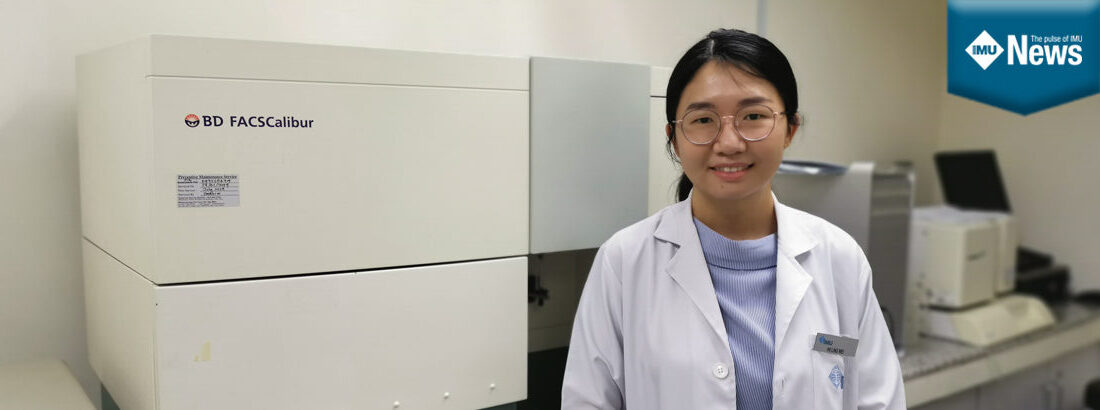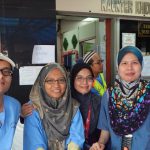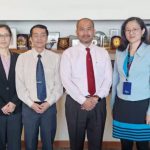An International Medical University (IMU) lecturer from the School of Pharmacy, Hii Ling Wei, secured the prestigious Malaysia Toray Science Foundation (MTSF) Grant for year 2020. She is awarded a MTSF Science and Technology Research Grant (STRG) of RM20,000 funded by Toray Science Foundation, Japan. Her research project will be working on rapid identification of effective drugs against pancreatic cancer cells with acquired immune resistance to cytotoxic T cell-mediated cytotoxicity, with co-researchers, Prof Leong Chee Onn and Dr Mai Chun Wai. Pancreatic cancer is an aggressive and lethal malignancy with the lowest overall 5-year survival rate among all cancers. To date, the therapeutic options available for pancreatic cancer have limited efficacy to improve disease prognosis. In addition, pancreatic cancer is also characterised by its capability to resist anti-tumour immune response. Drugging immune-resistant cancer cells could be a potential treatment strategy for pancreatic cancer.
| About the Malaysia Toray Science Foundation |
|---|
| The Malaysia Toray Science Foundation was established in 1993 through a RM4 million endowment by Toray Industries, Inc., Japan. The Foundation is registered with and recognised by the Malaysian authority as an organization formed to promote and advance science and technology in Malaysia. The Foundation aims to contribute to the progress of science and technology in Malaysia, particularly for the fields of natural sciences, by offering supports for national scientific and technological advancement. The Foundation assists scientists and researchers through research grants, and awards prizes for outstanding achievements which contributed to scientific and technological progress. |
Earlier in May 2020, Ling Wei also has been selected as one of recipients of Year 2019 MAKNA Cancer Research Award (MCRA) which carries a grant of RM 30,000 funded by National Cancer Council of Malaysia (also known as Majlis Kanser Nasional – MAKNA). Her MCRA awarded project is looking into the regulatory mechanism of a functional kinase called sphingosine kinase 1 (SPHK1) in breast cancer stem cells.
The unique stem-like characteristics of breast cancer stem cells have significant implications on therapy resistance and cancer recurrence. However, current understandings on the regulatory mechanisms in cancer stem cells are mainly based on the initial knowledge on normal adult stem cells. Understanding this novel mechanism may generate a breakthrough avenue of using relevant pathway inhibitors to treat refractory breast cancer, especially when there are FDA-approved drugs that targets this pathway ready for rapid clinical translation.
| About MAKNA and MAKNA Cancer Research Award |
|---|
| MAKNA is a non-profit organisation that aims to mobilise resources in order to provide curative, preventive, research and support services to cancer patients and their families, high-risk groups and the general public, in Malaysia and the region. MAKNA strives to utilise all efforts, expertise and finance from all sectors of the society, to fight cancer and reduce related pain, morbidity and the suffering that cancer patients undergo. Since its establishment in 1994, it has been committed in reaching out to public and cancer patients, as well as in promoting cancer research development and collaborations. MRCA was initiated in the year 2001 to encourage and recognise the importance of research and development by Malaysian scientists in advancing knowledge that is geared towards helping cancer patients and discovering potential cures for the disease. This prestigious cancer research award has been successful in offering an avenue for Malaysian scientists to conduct and implement cancer researches, which undoubtedly contributing to the advancement in cancer prevention, diagnosis and treatment for public wellbeing, locally and globally. |
Ling Wei is grateful to all funding bodies for the recognition and opportunities granted. She also appreciates the support from the institution, IMU School of Pharmacy, IMU Institute Research, Development and Innovation (IRDI), as well as IMU Research Laboratory.










